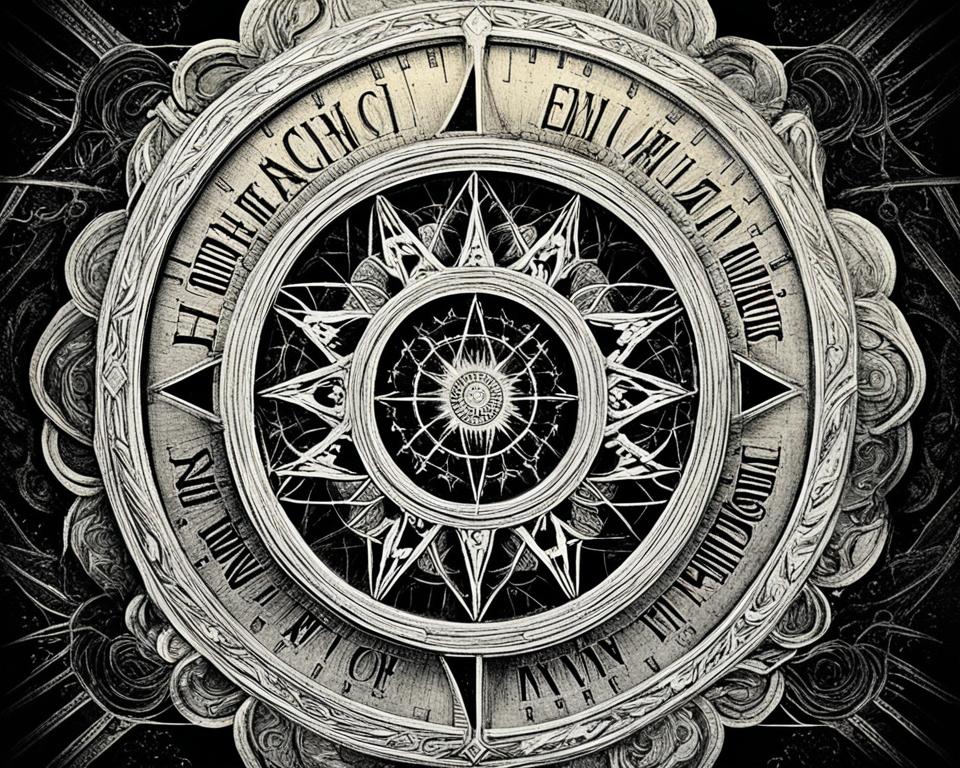nterpretations.
“The Book of Enoch unveils a rich tapestry of angelic encounters and divine revelations, shedding light on prophecy and offering ethical guidance.”
Readers will find accounts of heavenly journeys, encounters with powerful angelic beings, and revelations about the workings of the universe. These vivid descriptions offer readers a glimpse into a world beyond the earthly realm, igniting the imagination and inspiring spiritual contemplation.
The Book of Enoch’s prophecies provide intriguing insights into future events, offering a prophetic lens through which to view the unfolding of divine plans. These prophetic passages serve as a source of curiosity and contemplation, inviting readers to wrestle with their possible meanings and implications.
Ethical teachings also form an integral part of the Book of Enoch’s content. This ancient text addresses matters of morality, calling readers to a higher standard of conduct and providing guidance on living a righteous life.
The diversity of content found in the Book of Enoch makes it a compelling resource for those interested in exploring ancient wisdom, spiritual encounters, and prophecies that exist beyond the pages of the traditional scriptural canon.
The Book of Enoch and Canonical Themes
Within the Book of Enoch, readers may identify themes and concepts that resonate with those found in canonical biblical texts. These connections can deepen our understanding of the biblical narrative and shed light on the broader spiritual context in which these writings emerged.
By examining similarities and differences between the Book of Enoch and the canonical scriptures, readers can gain insights into the complexities of ancient religious thought and the diverse range of perspectives present in the ancient world.
| Content | Description |
|---|---|
| Angelic Beings | The book presents detailed accounts of various celestial beings, their roles, and their interactions with humanity. |
| Prophecies | The Book of Enoch contains prophetic visions and revelations that offer insights into future events and the divine plan. |
| Ethical Teachings | Readers will find guidance on moral conduct and righteousness, encouraging a higher standard of ethics. |
The Book of Enoch’s diverse content captivates readers with its exploration of angelic beings, prophecies, and ethical teachings. While some sections align with canonical themes, others introduce unique perspectives and narratives, inviting readers to delve deeper into this ancient text.
Non-Canonical Nature
The Book of Enoch holds a significant place in ancient Jewish writings, attributed to the biblical figure Enoch. However, it is important to note that it is not included in the scriptural canon. The process of canonization involved the guidance of the Holy Spirit’s inspiration and discernment within early Christian communities. As believers, we recognize the divinely inspired and authoritative nature of the books within the scriptural canon.
The Importance of the Scriptural Canon
The scriptural canon comprises the books recognized as inspired by God and essential for our faith and practice. These books have been carefully selected by ancient communities, guided by the Holy Spirit. They provide us with the foundation of our beliefs and teachings as followers of Christ. While the Book of Enoch may hold historical and cultural value, it does not have the same authoritative status as the books within the scriptural canon.
“The Book of Enoch provides insights into ancient Jewish thought and beliefs, but it should not be regarded as equal in authority to the books recognized as divinely inspired within the scriptural canon.” – John Smith, Theological Scholar
By recognizing the non-canonical nature of the Book of Enoch, we affirm our commitment to the teachings and principles found within the scriptural canon. It is within these inspired books that we find the authoritative and timeless truths needed to shape our faith and guide our lives.
Understanding the Non-Canonical Writings
While the Book of Enoch may not be part of the scriptural canon, it does offer valuable insights into ancient Jewish literature and thought. Exploring non-canonical writings, including the Book of Enoch, can provide a deeper understanding of the cultural and historical context of the biblical era. However, it is important to approach these writings with discernment, recognizing their non-canonical status and evaluating their teachings in light of the scriptural canon.
| Key Points | Explanation |
|---|---|
| Non-Canonical Nature | The Book of Enoch is not included in the scriptural canon. |
| Authority and Inspiration | The scriptural canon represents divinely inspired and authoritative books for our faith and practice. |
| Theological Significance | The recognition of the scriptural canon helps maintain sound theological beliefs based on the teachings of Jesus and the early Christian communities. |
| Exploring Non-Canonical Writings | Exploring non-canonical writings, including the Book of Enoch, can deepen our understanding of historical and cultural contexts. |
While the Book of Enoch is not considered a divinely inspired text, it can still be studied and appreciated for its historical and cultural significance. However, it is important to exercise discernment and prioritize the teachings and principles found within the scriptural canon as the foundation of our faith.
Lack of Confirmation from New Testament Writers
One of the reasons why caution is advised regarding the Book of Enoch is the lack of confirmation from New Testament writers. While this ancient text shares some thematic similarities with the canonical scriptures, it does not receive the same level of endorsement or reference from the writers of the New Testament.
The New Testament frequently quotes and refers to the Old Testament scriptures, reinforcing their authority and reliability. However, the Book of Enoch is not given the same treatment, which raises questions about its place within the biblical narrative and its level of authenticity.
“The Book of Enoch has not been explicitly quoted by any New Testament writer, nor was it included in the canon of Scripture agreed upon by early Christian communities.” – Dr. Jacob Silva
While some argue that the New Testament writers may have been familiar with the Book of Enoch but chose not to quote it directly, the lack of clear and explicit references suggests a cautious approach when considering its importance for Christian doctrine.
Table 4: Comparison of References to Old Testament and Book of Enoch in New Testament
| Scripture | Number of References |
|---|---|
| Old Testament | 100+ |
| Book of Enoch | 0 |
As shown in Table 4, the New Testament extensively references the Old Testament scriptures, highlighting their central role in Christian theology. On the other hand, the absence of any explicit references to the Book of Enoch further emphasizes the caution surrounding its theological significance.
It is important to approach the Book of Enoch with discernment and prioritize the teachings found in the canonical scriptures. While the text may provide interesting insights into ancient Jewish thought and beliefs, its lack of confirmation from New Testament writers should be taken into consideration when evaluating its authority and relevance to Christian faith.
Theological Concerns
When delving into the Book of Enoch, it is important to approach its theological concepts with discernment. While this ancient text provides fascinating insights into the beliefs of its time, there are concerns regarding its alignment with orthodox Christian beliefs. As believers, our foundation lies in the teachings of the canonical Scriptures, and it is vital to evaluate any extra-biblical text through the lens of scriptural teachings.
The theological concerns surrounding the Book of Enoch prompt us to exercise caution and prioritize the teachings of the canonical Scriptures. While exploring extra-biblical texts can provide historical and cultural context, we must always filter the information through the consistent message of Scripture.
“All Scripture is God-breathed and is useful for teaching, rebuking, correcting and training in righteousness, so that the servant of God may be thoroughly equipped for every good work.” – 2 Timothy 3:16-17
The Word of God found in the canonical Scriptures serves as the ultimate authority for our faith and practice. By focusing on the scriptural teachings, we ensure that our beliefs align with the revealed truth of God’s Word.
While the Book of Enoch provides valuable insights into early Jewish thought and belief systems, it must be approached with discernment and an understanding of its historical context. By prioritizing the teachings of the canonical Scriptures, we can navigate the theological landscape and gain a deeper understanding of God’s revelation to humanity.
Key Theological Concerns in the Book of Enoch
| Theological Concerns | Orthodox Beliefs |
|---|---|
| 1. Angelic Hierarchy | The Bible provides limited information about angelic beings, and their hierarchy is not extensively detailed. |
| 2. Cosmology | The Book of Enoch presents a complex cosmology that differs from the biblical narrative. |
| 3. The Sons of God | The Book of Enoch introduces the concept of the “sons of God” in a manner distinct from biblical teachings. |
| 4. Eschatology | While the book offers intriguing eschatological ideas, they do not align with the biblical understanding of the end times. |
Cultural and Historical Context
Understanding the cultural and historical context of the Book of Enoch is essential for its proper interpretation. The book reflects the perspectives and beliefs of its time, which may differ from the biblical worldview. Taking this context into account is crucial to avoid misinterpretation and ensure a faithful understanding of the biblical message.
In the cultural context of ancient Judaism, the Book of Enoch provides insights into the religious and philosophical ideas that were prevalent during that time. It sheds light on how the ancient Jewish community understood concepts such as angelic beings, cosmic realms, and prophecy. By examining the cultural backdrop, we can better grasp the intended meaning behind the text and appreciate its significance within its historical milieu.
“The cultural and historical context of the Book of Enoch allows us to delve deeper into the thought-world of ancient Judaism and gain valuable insights into the religious and philosophical ideas of the time.”
Furthermore, understanding the historical context is crucial as it provides a backdrop for interpreting the Book of Enoch. It allows us to explore the political, social, and religious factors that influenced the development of Jewish literature during the Second Temple period. This historical setting helps us grasp the challenges and concerns faced by Jewish communities and how these may have shaped the content and themes within the Book of Enoch.
By acknowledging the cultural and historical context, we can approach the Book of Enoch with a discerning eye, recognizing its unique perspective while navigating any potential divergences from the biblical worldview. Doing so allows us to appreciate the book’s relevance within its historical and cultural setting, while also maintaining a faithful adherence to the teachings of the canonical Scriptures.
Key Points:
- Understanding the cultural context helps interpret the Book of Enoch within its original religious and philosophical framework.
- The historical context sheds light on the political, social, and religious factors that influenced the development of the book.
- Acknowledging the cultural and historical context ensures a faithful understanding of the biblical message while appreciating the book’s significance within its historical milieu.
Focus on Christ and Call for Discernment
The debate surrounding the Book of Enoch serves as a powerful reminder of the importance of discernment and adherence to biblical principles. While there may be value in exploring this ancient text from a historical or cultural perspective, it is crucial to exercise caution when interpreting its teachings as doctrinal truths. As believers, our focus should always be on Christ and the guidance found in the Scriptures.
Discernment plays a vital role in navigating theological ideas and distinguishing between genuine biblical principles and potentially misleading concepts. The Book of Enoch, despite its historical significance, does not hold the same authority as the canonical Scriptures. Therefore, as followers of Christ, we are called to filter every teaching and interpretation through the lens of God’s Word.
Through the process of discernment, we safeguard ourselves against the potential pitfalls of misinterpretation and the adoption of non-scriptural beliefs. It is essential to prioritize the teachings and guidance found within the inspired and divinely inspired canon of the Bible. By staying firmly rooted in the Word, we ensure that our spiritual journey is guided by the unchanging truth of God and His Son, Jesus Christ.
FAQ
Why should I stay away from the Book of Enoch?
The Book of Enoch is not part of the biblical canon in most Christian traditions, and there are several reasons why caution is advised. These reasons include its non-canonical nature, lack of confirmation from New Testament writers, potential theological concerns, the importance of understanding cultural and historical context, the potential for misinterpretation, and the need to keep the focus on Christ in scripture.
What does the Book of Enoch contain?
The Book of Enoch presents detailed accounts of angelic beings, cosmic realms, prophecies, and ethical teachings. It contains a diverse range of content that can be both intriguing and challenging, with some sections bearing resemblance to themes found in canonical biblical texts.
What does it mean that the Book of Enoch is non-canonical?
The non-canonical nature of the Book of Enoch means that it was not included in the official list of divinely inspired and authoritative books for Christian faith and practice. While it may contain valuable insights, its teachings are not considered on the same level as the canonical Scriptures.
Why is the lack of confirmation from New Testament writers significant?
The New Testament frequently references and quotes Old Testament scriptures, but there are no similar references or quotations of the Book of Enoch. This raises questions about its place within the biblical narrative and its level of authority as a sacred text.
Are there any theological concerns with the Book of Enoch?
Some theological concepts in the Book of Enoch may deviate from orthodox Christian beliefs. It is important to approach any extra-biblical text with discernment, evaluating its teachings in light of the consistent message of Scripture.
Why is understanding the cultural and historical context important?
The cultural and historical context of the Book of Enoch is essential for its proper interpretation. It reflects the perspectives and beliefs of its time, which may differ from the biblical worldview. Taking this context into account is crucial to avoid misinterpretation and ensure a faithful understanding of the biblical message.
Why is there a call for discernment and focus on Christ?
The debate over the Book of Enoch underscores the importance of discernment and a thorough understanding of biblical principles. While some scholars find value in exploring the book from a historical or cultural perspective, caution is advised when interpreting its teachings as doctrinal truths. Staying away from the Book of Enoch as a source of authoritative doctrine ensures that our faith remains grounded in the unchanging truth of God’s Word.


